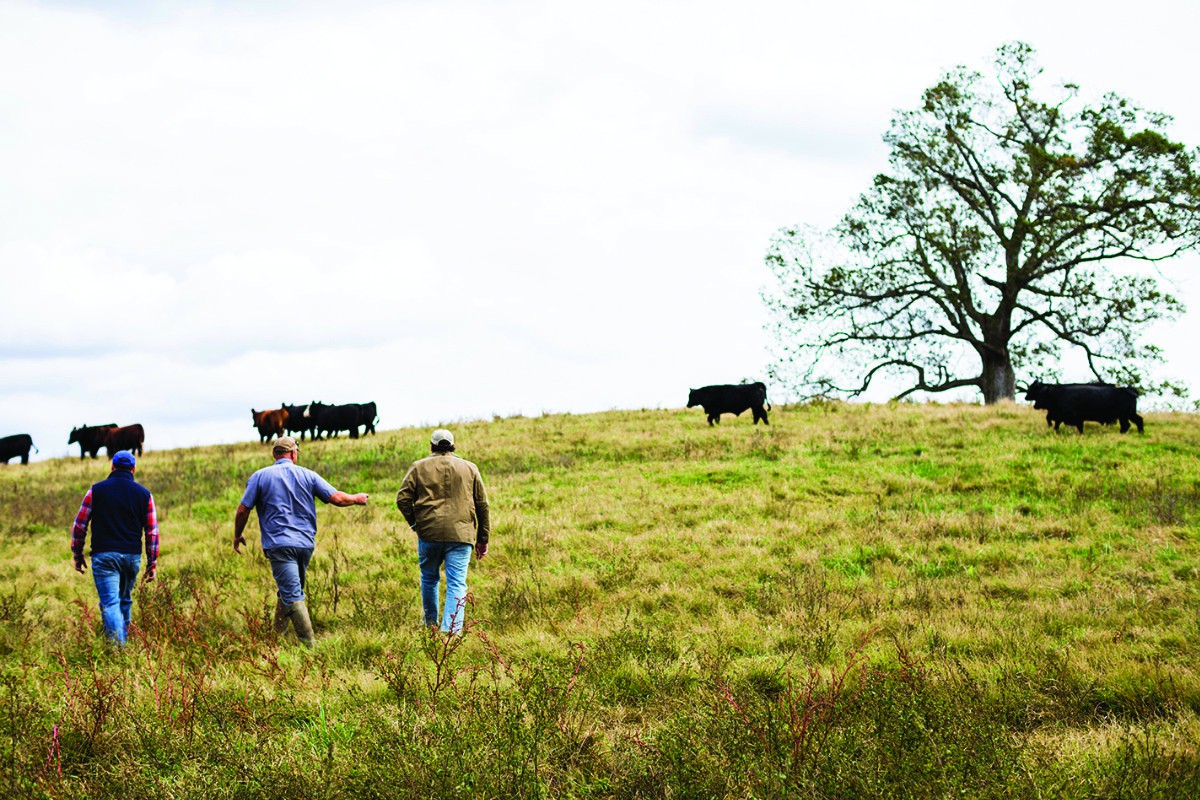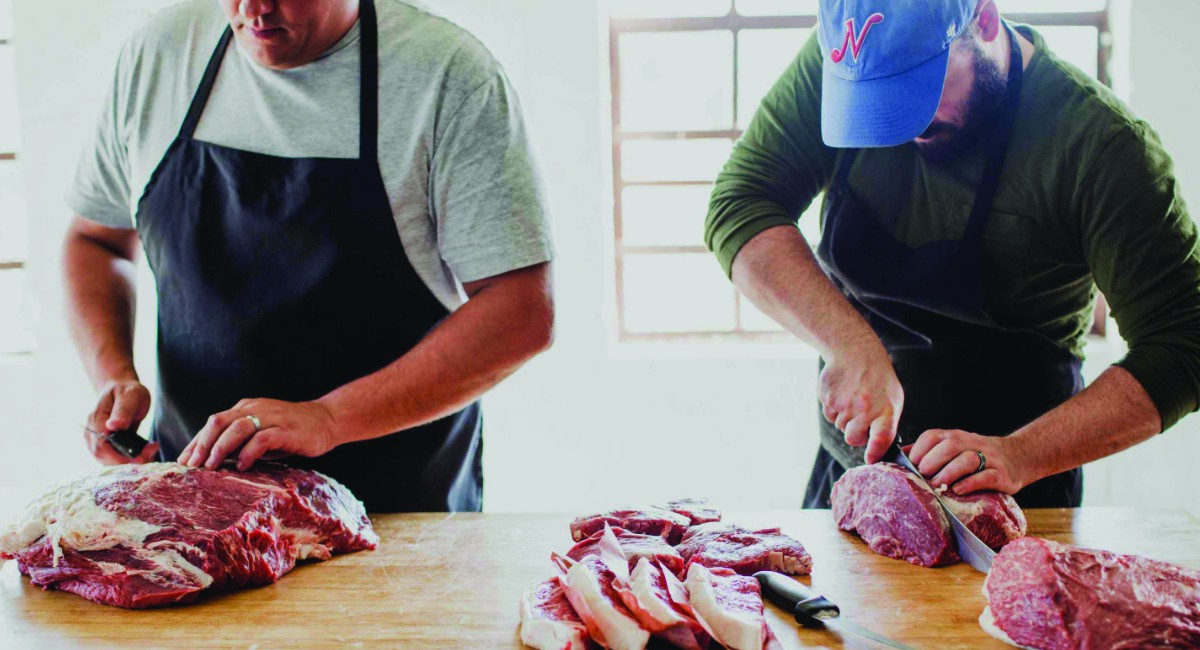Chris Carter and James Peisker, co-owners of Porter Road, come from culinary backgrounds and met in the kitchen of a restaurant in 2010. It didn’t take long for them to discover they shared many philosophies about food. One of those is that if you know where food comes from, you can generally make it taste better. Also, the two agree that greater control over the process from farm to fork leads to better overall quality of the product. Eight years later with a retail store, a processing facility and new online butcher shop, the plan has evolved but the idea of quality and how to sustain it remain.
The first steps
Carter and Peisker pursued excellence in quality and flavor by first going to the source – the farmer. Their quest to provide the best possible product for consumers inspired them to use local ranchers and in 2010 open their whole animal butcher shop in Nashville, Tennessee. Understanding the farmers and their needs plays a role in all the decisions that Peisker and Carter make.
“The reason we did whole animal is because it made it easier for the farmer,” Peisker says. “If we’re trying to buy just what the customer wants – the middle – nobody can actually do that.”
The two thought the brick-and-mortar butcher shop would “…be a little family business,” that they would run together. They planned to hire a high school kid to wash the dishes and leave it at that.
“By the end of the first year we had almost 20 employees,” Peisker says. “The city really embraced us with open arms and our goal was to constantly get better product and more of it available for them.”
To achieve their goal of getting more high-quality product to their customers, Peisker and Carter decided they needed to gain as much control as possible. To do that, they purchased a processing facility in Kentucky, close to the farms where they got their animals. This gave Porter Road a closer look at what the farmers were doing and how they were doing it.
“We were able to look at the farmers’ practices and pushed back the curtains to understand where the meat was coming from,” Peisker says.
The continued push for more products in the retail store led to a wholesale business, consisting of Peisker and Carter’s restaurant contacts, that sells the lower-margin items such as bones and ground beef, and the opening of their first online butcher shop in February 2018.
The 7,500-sq.-ft., federally inspected facility possesses the potential to process 20 head of beef and 30 hogs in an eight-hour shift, and while not at capacity, the small facility utilizes all its space, with Q4 of 2018 production sending 40 percent to online customers, 40 percent to wholesale and 20 percent through the brick-and-mortar shop.
“We do beef, pork and lamb. We don’t do poultry yet. We’ll probably need a different facility for that, because out of the 7,500 sq. ft., we use every last square foot of it,” Carter says. “There’s like stacks on top of each other. Pure efficiency. We really like our systems that we’ve put into place because that’s the only way you can make things work.”
For Carter and Peisker, efficiency does not mean pumping out as much product as possible. The company dry ages the entire carcass for 14 days, which keeps it from going through any process too fast. The two owners believe this is an important step because the less they focus on production volume, the better the quality the products will be.
“So, the trim that we use for our hot dogs or our ground beef is 14-day dry aged,” Peisker says. “Our roasts are 14-day dry aged. It just adds an extra complexity of flavor that is so unique to what we do.”

Unique model
Transparency from farm to fork, consumer education, and as always, high quality all contributed greatly to the purchase of the Kentucky processing plant. The slaughtering of the animal represented the last piece Porter Road needed control over to offer the best possible product it could across all its business channels.
Before being purchased by Porter Road, the facility had been open off and on for 40 years in different iterations, and the company changed names about five times. It was in bad shape and took Porter Road about two years of work before Carter and Peisker were comfortable running the business out of it.
“We used to do a lot of custom processing and that’s kind of how the place paid the bills, but for us the focus on what we wanted do there called for a lot of adjustments to be made,” Carter says. “Now we’ve got 30 or so employees in there making a very good wage with health insurance and 401(k)s.”
The employees at the slaughterhouse accentuate everything Porter Road has cultivated from the beginning.
“It didn’t take us long after opening the butcher shop to realize that they were the missing link,” Peisker says. “We teach our employees all the time that somebody could have spent two full years of their life working on this beef to make sure that it’s perfect because they’re pasture raised. They take a little longer than commodity meat and somebody has spent all this time and you can mess it up in one knife stroke.”
Every segment of Porter Road’s business – wholesale, brick-and-mortar retail and online retail – begins at the processing facility. Of the approximately 40 farmers in the Kentucky and Tennessee area, the company has a special relationship with one who the owners consider more of a partner than a supplier.
“He’s the one that helps us orchestrate and vet everybody and make sure everything is getting fed properly and helps make the feed rations and get everything fixed up,” Peisker says. He also transports most of the animals coming to the facility from the farms.
“Everything is done under one roof,” Carter says. “The animal walks in one door [at the processing facility] and leaves in one of two ways. One, on our very own trucks which go to Nashville for wholesale and to the retail location, or in UPS trucks which go directly to online consumers.”
Technology and craftsman-style butchery live symbiotically throughout production, but Porter Road uses handsaws and knives for most of the breakdown and fabrication.
“That way we can pull out cuts like the teres major, the flat iron, the picanha, the flap, all those delicious cuts that in an efficient, regular disassembly line packing house you’re not going to have the skilled people in the correct spots to be able to pull all those out,” Carter says. “Technology plays a role in our inventory management system, and that’s the biggest thing.”

Source: Porter Road
Changing the industry
Porter Road’s commitment to providing quality, unique cuts and processing humanely, 100 percent pasture raised animals with no antibiotics or hormones, starts on the farm. Carter and Peisker have nurtured those relationships with farmers since the beginning, when they still sold at farmers markets and had just begun opening the butcher shop.
“You can tell when somebody truly cares about their animals and when somebody truly cares about their land and wants to make and impactful difference,” Peisker says. “Those are the people that we want to work with.”
Carter says he believes that most farmers do care about their animals and the land. The struggle comes in the need to make a living, pay the bills, sustain the farm, etc. He and Peisker understand the leap of faith it takes for a farmer to make the investment in their animals and trust that Porter Road will buy them when time comes.
“I think some people really understand it and really get it and want to help change the world with us,” he adds.
A desire to change the world by changing the meat industry through a local farm-to-fork movement might sound like a lofty task, but to Peisker and Carter it is very real and drives them to scale Porter Road up yet remain small in the way it does things.
The butchers at Porter Road look at Carter funny every time he tells them they’re changing the world, but he tells them anyway, and he believes it.
“If we change one person’s mind and eating habit and get them to a pasture-based animal product that’s slaughtered in a humane way, then we feel like we have changed the world,” Carter says.
Carter and Peisker view changing the industry standard one person at a time and putting animals back into the pasture as a moral obligation to the environment, the farmer and consumer health. They also think the meat just tastes better.
The Porter Road plan to change the meat world starts with its existing business; the retail store, online butcher shop, processing facility and use of local farmers onboard with the company’s ideals, vision and way of doing things. Known as the “playbook,” Carter and Peisker plan to take the existing model, its HACCP plan and operating procedures, etc., and put it into place in new areas.
“I think we’re truly making a big impact if we can help decentralize the meat industry, focus on quality, focus on giving power back to the farmers, help keep money in small rural communities and truly become the first national local meat company,” Peisker says. “We would like to have multiple plants in multiplelocations.”
“We go into a new area, we get to revitalize agriculture in that area and supply jobs to people in that community, as well,” Carter adds. “It’s a win-win across the board.”
In terms of profits for the company, the two owners view their unique approach to growth as advantageous and an opportunity to earn more, provide quality and achieve their lofty goals. It provides more product to the customer while relieving animals the stress of travel by keeping operations closer to the farm.
“It’s going to keep them healthier by not having to move them to centralized feeding or slaughtering operations,” Peisker says.
Carter and Peisker have begun their due diligence on finding the next place to put a complete Porter Road model. The goal is to bring “life changing meat” to anyone in the lower 48 willing to pay for a premiumproduct.
“We’re trying to figure out which location that is. That has to do with shipping, the actual facility, farms that are there now, how they’re raised, what they’re fed and all of that,” Peisker says. “Out of all the meat raised in this country, less than 1 percent would actually fit into our system at Porter Road; hopefully we can be a big change for that.”

